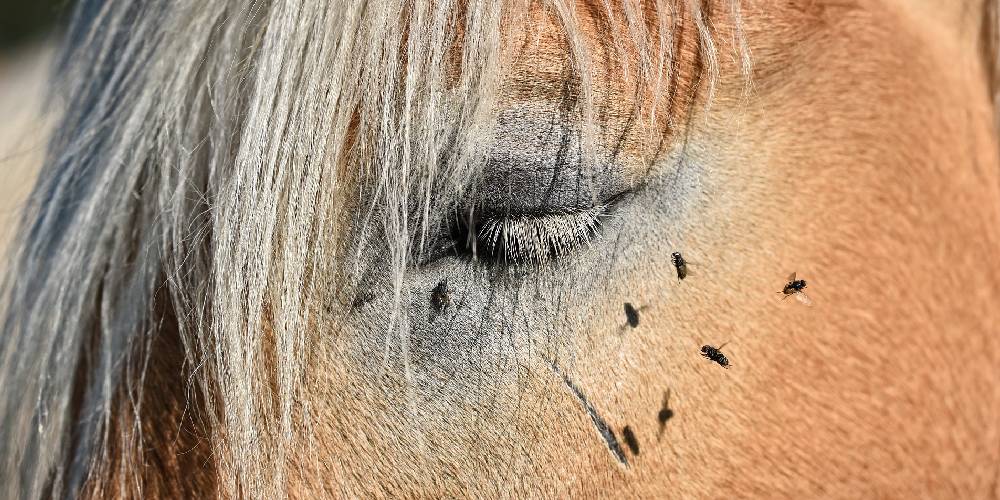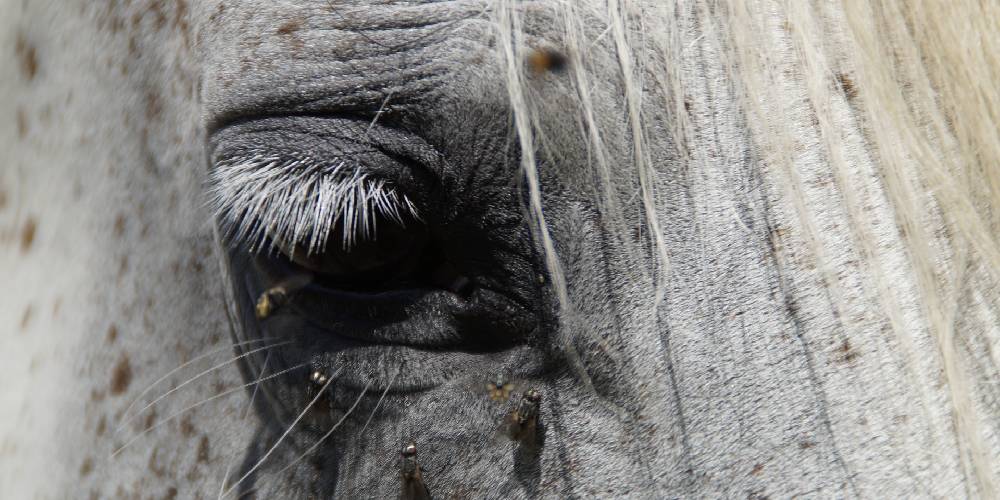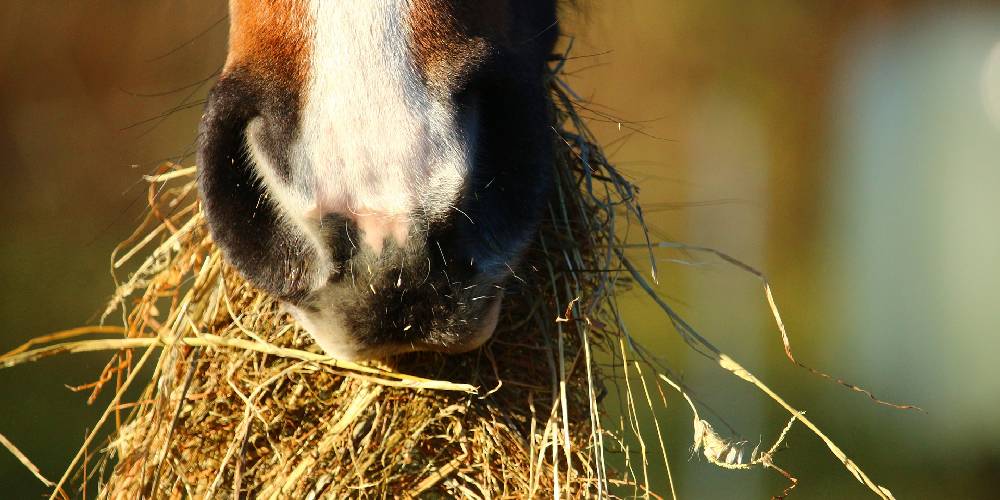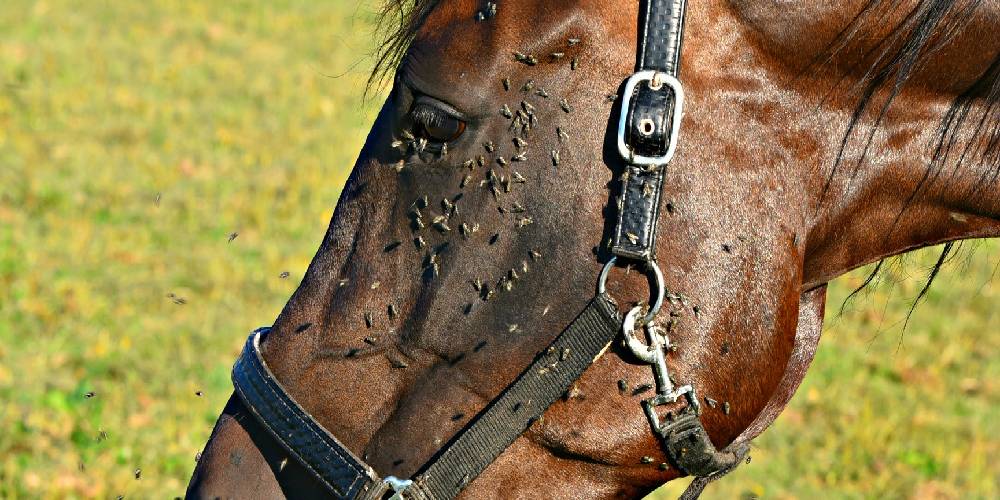Fly spray is a vital tool when it comes to taking care of the horse’s fly problem in summer. But how does it work? Why do horses use it? And is it safe to use?
Why Do Horses Need Fly Spray?
Fly spray is really a helpful thing to have around in the summer and spring months when flies seem to be everywhere. Horses might need fly spray to help protect their bodies and faces in places that are hard to cover. Fly spray is a great help when dealing with areas that a fly mask, fly boots, or a fly sheet can’t protect from these pesky pests. This spray helps horses stay more comfortable and stay fly-free for longer.
How Is Fly Spray Applied?
Fly spray is applied to the horse’s coat by using an aerosol can or spray bottle. Fly spray can be applied all over the horse’s bodies, but just remember to avoid their eyes and mouth. Spray a thin even mist of fly spray over the horse’s coat from about 8 inches away. You don’t want to soak spots of their coat with fly spray.
If I want to put fly spray on the horse’s face, I will usually pump a few squirts of the spray into my hand and use my hand to then rub the liquid on their face. Some horses will let you spray the mist on their faces, but because mine didn’t like that I just used my hand as I said before.
Where Can I Buy Fly Spray?

Fly spray is actually really easy to find. They usually can sell bottles or canisters of it at different feed and tack stores. There are also several stores that offer it for sale online through delivery services.
How Does It Ward Off Flies?
Most fly sprays that I have encountered use a substance called citronella. This substance is actually a natural oil found in a type of Asian grass plant. Citronella is most commonly used as a mosquito and fly repellent and is put into horse fly spray to aid in warding off flies. Sometimes, citronella is even put in candles for the same purpose.
Is Fly Spray Safe For The Horse?

Yes, fly spray is entirely safe for use on horses except for those allergic to these sprays. Some artificial sprays containing chemicals may not be entirely safe for horses, but there are many natural ones that work great!
Is It Difficult To Make Homemade Fly Spray?
No! It isn’t difficult to make your own fly spray at all! All you need is water, dish soap, and vinegar, as well as a spray bottle and you should be good to go.
First, add four tablespoons of dish soap to your spray bottle. This is equivalent to one fourth of a cup.
Second, you will add two cups or one pint of white vinegar to your spray bottle.
Finally, add one cup of warm water to the bottle and shake it up to help mix it all together.
This mixture has worked really well for my horses, and flies have died nearly instantly if they were sprayed. This mix should help you to keep flies away!
Can Fly Spray Be Bad For Horses?
Like I mentioned before, there are few fly sprays that are bad fro horses. The only fly sprays I would keep away from are ones filled with chemicals, and bug sprays not intended for horses. This would include bug sprays for people, pest poison spray, bug spray for water troughs, feed bins, and fencing, and other sprays.
Make sure that you NEVER use sprays not intended for use directly on horses. This goes for any products not deemed safe fro use on horses.
Avoid using fly spray on horses that have allergies. Sometimes, natural fly sprays can work best for horses with allergies rather than your average store-brand sprays.
What To Avoid When Using Fly Spray

Avoid Water
Make sure that when you are applying fly spray to your horse’s coat, that you are keeping the spray away from their water. Some sprays have chemicals that are safe to use on the horse’s coat, but not safe for the horse to consume. Try to keep your horse away from water troughs, water buckets, and automatic water dispensers when applying fly spray to your horse’s coat.
Avoid Food
Make sure that fly spray is not contaminating food such as hay, pellets, medications, or supplements. The same precautions should go for use around water as it is for use around food. Make sure not to get spray on the food as there may be harmful chemicals in the spray that the horse is not okay to ingest.
Avoid Nostrils
Yes, I know. Horses constantly have an army of flies buzzing around their muzzles so it is really hard to not just give the horse’s nose a good squirt. Try to use the fly spray when it is sprayed on a rag or on your hand and rubbing it on the horse’s muzzle instead of spraying it. This is because the spray might contain chemicals that could hurt the horse if the horse inhales them.
Avoid Mouth
Be careful when bringing fly spray near a horse’s mouth. The spray should never be used on the horse’s lips or mouth at all. just the chin and between the nostrils is the closest this substance should go. This is because, like I have said before, horses shouldn’t ingest the spray for fear of colic or another bad reaction.
Avoid Eyes
Have you ever gotten something in your eye causing it to burn and tear up? This same thing can happen to horses if they get something in their eye. This is why you should try to avoid spraying directly on the horse’s face and use a rag or your hand to apply it in this area.
Avoid Wounds
Horses who have wounds, especially infected wounds, are fly magnets so it is really quite tempting to spray fly spray on the affected area to relieve the horse of those pesky flies. Try to avoid doing this because the chemicals in the spray might not help the horse’s injury. I recommend wiping the spray around the wound and protecting the wound with a sterile bandage or light covering to let it heal without flies taking over the infection.

